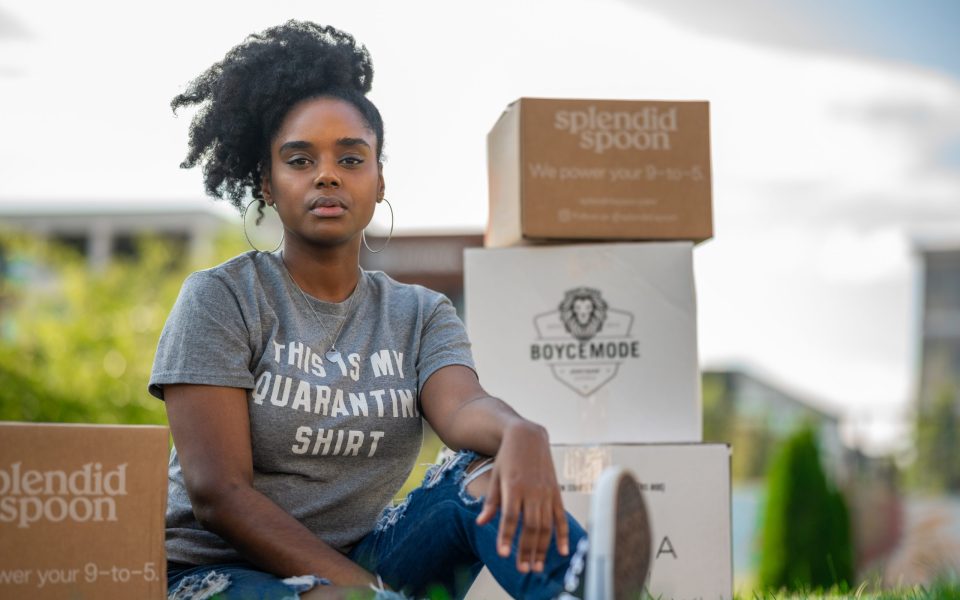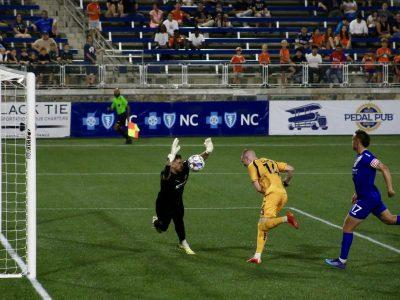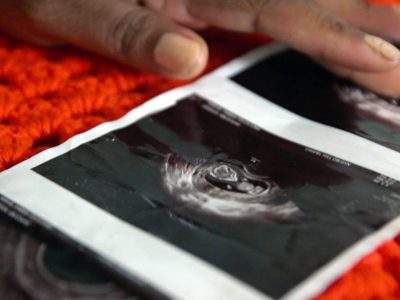As the effects of the pandemic began to unfold within the US in March 2020, many people started scrambling to find ways to help communities in need. No one knew how long the various shutdowns would last nor how its effects would ripple and cut through every socio-economic level. According to Feeding America, the pandemic has caused millions of people to newly experience food insecurity, alongside those who were experiencing food insecurity before the COVID-19 crisis began. Increasing evidence also reveals that Black and Brown people are experiencing worse health outcomes from COVID-19, likely due to a combination of factors that stem from longstanding economic and health inequities.
Greensboro native Kimberly Barnes was among those scrambling to find ways to help amidst the chaos. Because COVID-19 has had a disproportionately negative impact on the Black community, Barnes reached into her background as a vegan chef and marketing consultant to provide vegan food to Black and Brown families living in food insecurity.
The Dudley High School and NC A&T University graduate is a self-taught chef and the CEO of Might Be Vegan, a media and marketing consultancy committed to helping people around the country discover plant-based diets. In April 2020, Barnes created a new hunger-relief program called Food Love to provide vegan food nationwide to those in need. She used her experience from helping feed more than 1,600 people at a vegan-only tailgate for Super Bowl LIII in 2019 as a starting point. Now, Food Love partners with several plant-based meal-delivery services to distribute prepared food dishes directly to the doorsteps of families in need, at no cost to them. The program also provides supplementary educational materials to families, like recipe booklets to help them incorporate more plant-based foods into their diets.
“I’ve heard a few times, ‘We don’t have anyone who’s vegan,’” Barnes says. “And then, I tell them, ‘Well, everyone eats fruits and vegetables.’ And then they get it.”
Currently, Barnes’s boxes are distributed though companies like Splendid Spoon and Boycemode. The meals are plant-based, ready-to-eat and feed families for a week. They include dishes like butternut squash noodles with broccoli and turmeric, pinto beans with spinach and bok choy, brown-rice taco bowls with smoked pepitas and black beans, linguini with shiitake mushrooms, white wine and parsley.
She hopes that by providing free and healthy meals, that Food Love can not only bridge the gap in food access, but also strengthen health outcomes for Black and Brown communities.
According to a 2020 study published by the New England Journal of Medicine, the hospitalization rates for Covid-19 among Blacks are approximately four and a half times that of whites. Health disparities in nutrition and obesity correlate closely with alarming racial and ethnic disparities related to Covid-19. People experiencing food insecurity and living in food deserts, predominantly Black and Brown people, only have access to low-cost, energy-dense processed foods. Currently, Food Love is the only national hunger relief program that is exclusively plant-based. It’s also the only national hunger relief program founded by a Black woman.
Barnes began her own personal journey into the land of veganism in 2017.
“I dabbled first because I didn’t understand it yet,” says Barnes who currently lives in the Northeast. “I was fearful of it not working or not being sustainable. I also wasn’t ready to give things up. Cheese, for example. It was later I realized that I wasn’t really giving up anything, I was gaining so much.”
Using her experience, Barnes thought to create a space for people who wanted to figure out what being vegan might mean for them. What started as a food-media property is now a multimedia company that develops online food content such as instructional videos, recipes and seminars with Black and Brown chefs around the country. And it’s the reason why she named her business Might Be Vegan, for those who might be vegan-curious or ready to jump in headlong.
Veganism excludes animal-derived ingredients and can be viewed as prohibitive to some communities.
“I found that the vegan community can be low-key judgmental, and I didn’t really appreciate that,” says Barnes. “I felt like, that is not how you encourage people to eat less meat, go plant-based or go vegan, by making them feel bad about themselves and their choices.”
Barnes says the best way to show someone that they can eat better is to show them through their tastebuds. A lot of people think eating vegan is eating raw salads and Barnes says that is not the case.
“Part of the goal is to introduce people to what it looks like to have a diet centered in vegetables, in food that is not processed with no preservatives and non-GMO,” Barnes says. “It’s all literally from the Earth to your table.”
For more information, visit Barnes’ website here. Find her on Instagram @itskimberlyrenee.
Join the First Amendment Society, a membership that goes directly to funding TCB‘s newsroom.
We believe that reporting can save the world.
The TCB First Amendment Society recognizes the vital role of a free, unfettered press with a bundling of local experiences designed to build community, and unique engagements with our newsroom that will help you understand, and shape, local journalism’s critical role in uplifting the people in our cities.
All revenue goes directly into the newsroom as reporters’ salaries and freelance commissions.





Leave a Reply